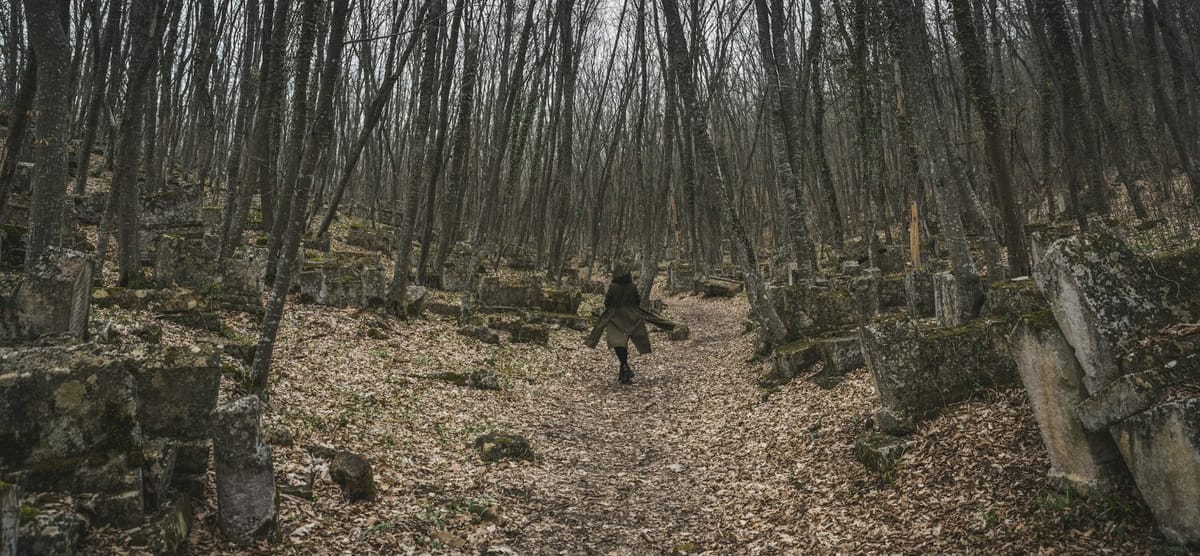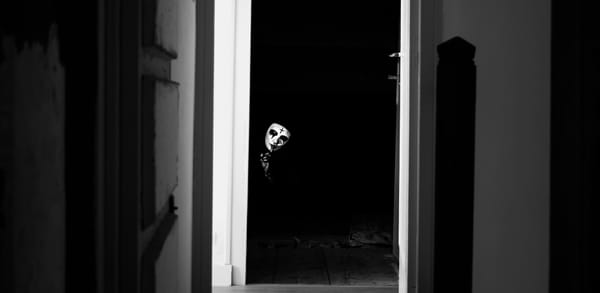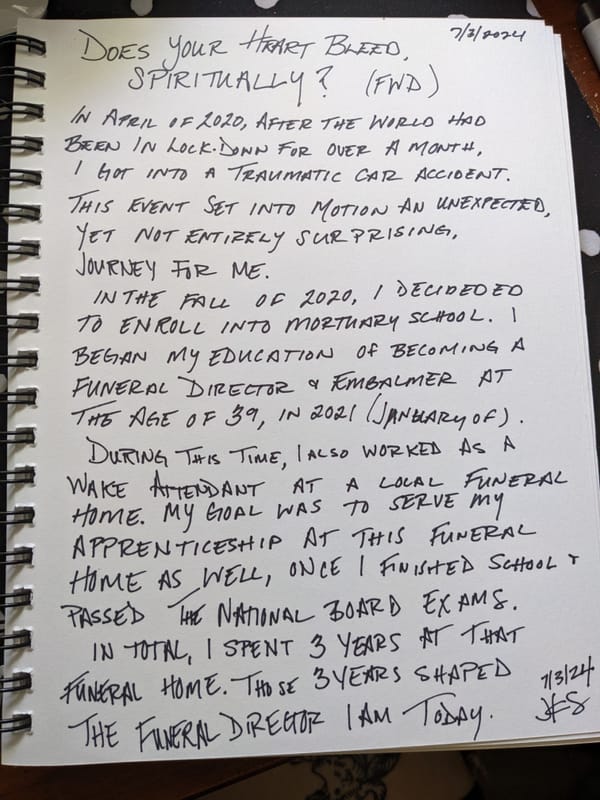Welcome to Deth Skool™ (Part 1)

Trusting high schoolers to know what they want to do with their lives and jump directly into college is absolutely bananas.
If I could go back to 17-year-old me and just set me down for a second, I’d tell me to take a few years off from schooling. I would encourage me to work, create art, fall in love, get my heart broken over and over, learn how the world really works, and THEN, I would tell me, go ahead and decide what I want to be when I grow up. It’s entirely plausible that I still would have taken the same muddled route that I did back then. I remember me at 17...I doubt I'd have listened to "Me From The Year 2024". I barely listened to anyone.
By the same token, I don’t think current-me has the time or patience to argue with 17-year-old me, let alone engineer a time machine so I suppose I’ll have to settle for having a true passion-chasing awakening as I did at 38. Sorry, past-me. And good luck to you.
I looked at a few different Mortuary Schools before I chose the right one for me. I sat in on some virtual open-houses, Q&A sessions, focusing specifically on schools which offered online classes so I could juggle work and school in a reasonable manner. As I was zeroing in on an online program at an out-of-state school, I learned that a school I’d toured back in 2014, and creeped on quite a bit in the years after that, was now offering an online program, too! And they were based in Illinois! They would require a week of in-person time, but not until the end of the second year! Surely I’d be confident with the idea of driving more than a mile a day by that point.
I was fairly anxious about the prospect of becoming a Mortician by my 40’s once I decided to enroll in Mortuary School. I also couldn’t wait to learn and grow my knowledge, though I was set on keeping a strict “I didn’t come here to make friends” vibe about me so I could focus specifically on my own goal. I have a deep tendency to let my dreams drop in order to support someone else’s, and now it was time to be selfish! I still couldn’t shake the feeling of being an old dog trying to learn new tricks, so I started researching people who became successful later in life.
Did you know Vera Wang designed her first dress at age 40? Stan Lee’s first hit comic, the Fantastic Four, debuted around the same time he turned 39. Toni Morrison wrote her first novel, “The Bluest Eye '' as she crested the fine age of 40. Martha Stewart’s first cookbook was published at the age of 41, and Julia Childs’ came at 50. Samuel L. Jackson’s breakout and first award-winning role came at 43 years old. A 46-year-old Rodney Dangerfield found a wee bit of respect and a far bigger amount of fame after performing his comedy on the Ed Sullivan Show.
All of these people, and many more, set the standard for me in acknowledging that there is, in fact, no standard for what touchstones in life you need to have met and by which age. Success isn’t measured by what you do, but how you define it for yourself. Success is continuing to reach for your dreams no matter what gets thrown your way. I can wish to go back in time to set my 17-year-old self as much success as possible, but that doesn’t change the fact that it happens when it’s meant to happen, which does not always align with when you *want* it to happen.
I love learning. I REALLY do. I have an odd memory, in that I can recall facts, people, conversations, forms, almost verbatim, however I have extreme test anxiety which means that cool recall gets turned off as soon as a test is placed in front of me. Knowing that I worked as hard as I could to do my best on all work necessary for class so that, if I bombed a test, I could make it up by doing well on assignments. Overcoming my fear bombing of tests and exams was going to be my biggest challenge, especially since I needed to pass oodles of exams not only to graduate, but to become a Mortician in the first place! Luckily, I would have two solid years to work through that. Nothing was going to deter me from reaching my goals!
Though, I did almost let fractions break me, if we’re being honest.
Real talk: The only time I almost bailed on mortuary school entirely was during the fractions portion of my Accounting course. Math and I have a storied past, and it’s kind of funny to think back on that day now, if not incredibly embarrassing: I was working through some math problems with my husband. He was (patiently) working with me to try helping my brain grasp the concept of dividing fractions, and I kept getting so mad at myself for just not getting it. Of all the things that could bring me to a breaking point, fractions were not one of them. I would gladly solo remove, embalm, and attempt to restore someone with severe decomposition than be faced with fractions EVER again.
My experience in Mortuary School was 70% Good (I learned A LOT, had teachers who have become pals, mentors, and amazing resources of knowledge beyond school; made friends I was so determined not to make but am beyond glad that I did), 15% Meh (courses you have to slog through as mandated by the syllabus, murmuring “what the actual fuck…” regarding some wacky in-class conversation threads), and 15% Not Great (watching classmates drop like flies every day til graduation, some instructors clearly not giving a crap whether their students are actually retaining information or not), which I think is all-around okay. I don’t think it’s a symptom of where I went (the Meh and the Not Good) as much as it simply is what it is.
My main problem with Mortuary School (and I don’t know if they all do this) is that the first time a student encounters a Real Live Dead Person for embalming purposes isn’t until the 3rd semester. Those embalming labs are a make-or-break moment, and it’s there that a large percentage of students truly break. It’s one thing to look at pictures, dummies, or other teaching materials and talk through concepts pertaining to embalming, but nothing is going to let you know if you can work with the dead quite as quickly as being in the thick of it.
I will never forget my make-or-break moment: It was my first day working in the morgue at my old hospital, and the gentleman training and mentoring me, James, talked me through what I was about to see. My first Morgue-Specific Dead Person was a young person who had been involved in a vehicular accident. I braced myself for the worst, but nothing could have prepared me for what I saw. My eyes started to get a bit hazy like they do when I’m about to pass out, and the color must have started to drain from my face. James told me to sit down for a second and grabbed me an ice cold Dr. Pepper from the mini-fridge in his office. He patted me on the shoulder and told me to take as long as I needed. I took a few sips and then excused myself for a moment, set the can down on his desk in the office, and ran upstairs to my locker. I grabbed a pack of chewing gum, popped a piece in my mouth, the extra sugar reviving my clarity of vision. I headed back down to the morgue, opened the office door, and was met with a huge grin. “Alright, you ready!” my mentor boomed, more of a statement and pleased to see me return. I nodded.
I hope everyone has someone like James as a mentor in their life at some point. He was a presence I couldn't properly explain if I tried; someone for which words could never quite do justice. A hulk of a man with the best laugh and kindest smile, he painstakingly taught me everything he knew about autopsies. He spent over 40 years as an autopsy tech, starting back when he was in the Navy. He had Big Grandpa Energy, was a snazzy dresser, and had a penchant for smoking cigarettes in the infectious disease freezer (and I’d join him on occasion). I found out he passed away a few years ago, and I wish he knew how much he shaped the paths I’ve chosen for myself. I don’t think he’d be one bit surprised.
My cohort at school started with over 80 people. That number dwindled as we made our way through the program, but I would argue it dropped a lot more during the embalming labs. I think this can be seen as both a positive and a negative - better to know it’s not for you sooner rather than later, but again, by this point you’re just beyond the halfway mark. Putting that much time and effort into something only to find out you aren’t able to physically do one of the main elements of the role is a crushing blow to a dream. In Illinois specifically, you have to complete embalmings and funeral directing responsibilities in order to obtain your license - you can’t pick one over the other, unless you obtained your license before that became the law in 1991.
So what is the solution? Should it be mandatory that students have more hands-on experience prior to beginning school, or do things stay as they are? I would argue that yes, anyone who is enrolling in mortuary school in a state where the license is combined should definitely have experienced (via witnessing, not necessarily participating in) an embalming in a real-time environment. This will lower the enrollment rate at mortuary schools, which is likely why it will never happen.
My advice to anyone who is enrolling in a program where they will need a strong stomach or understanding of the physical and emotional strain of the career is to have some real experience in those types of environments. Your time, knowledge, and understanding are so valuable. And of course, so is your money. If you’re going to put time, effort, and finances into something that you are hoping will propel you forward in your dreams, goals, and your life, period, then I strongly urge you to do everything you can before doing so to ensure this is really The Thing. Your Thing. I know that I never want to put myself in a position where I have given so much of myself to something that, in the end, was not going to give me my own successful outcome I worked so hard to achieve. I hope this helps anyone who is curious to do the same.
If you would like to support my writing, you can do so by buying me a coffee!



